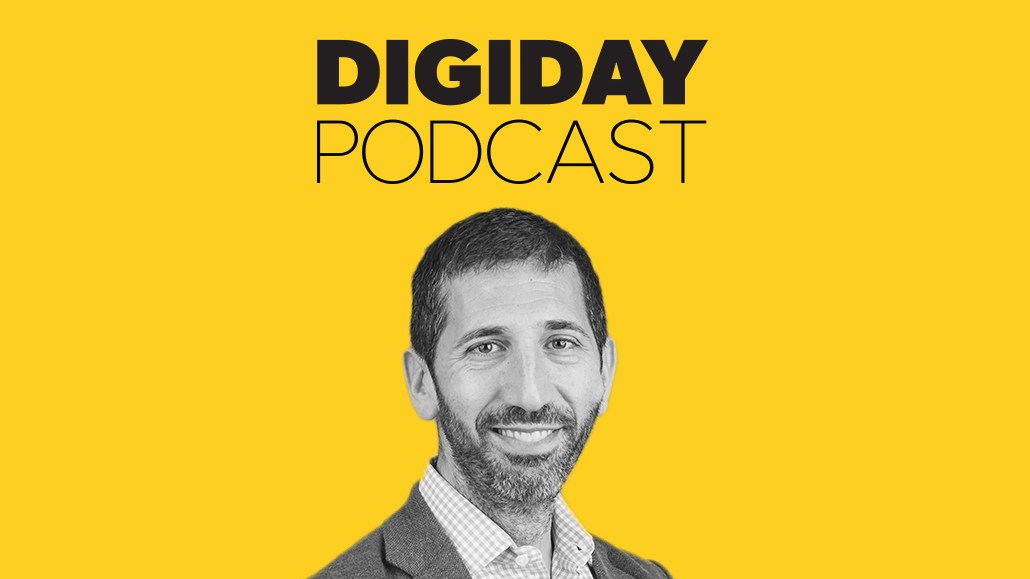Secure your place at the Digiday Media Buying Summit in Nashville, March 2-4
GARM’s lead sheds light on new standards for sustainability measurement in media

Subscribe: Apple Podcasts • Spotify
Making the digital advertising ecosystem more sustainable has been a burgeoning topic for the past couple of years, but the biggest excuse that’s been holding back companies from making moves to actually reduce carbon emissions is the lack of standards around measuring emissions in the first place.
But the Global Alliance for Responsible Media (GARM) and Ad Net Zero aimed to remedy those concerns with its Global Media Sustainability Framework, launched ahead of the Cannes Lions Festival earlier this month.
“We’ve reached a bit of an inflection point to sort of say, ‘Let’s do the right thing by the industry, and make sure that there is a voluntary, flexible framework that basically can enhance transparency, drive consistency and introduce rigor in a way that drives confidence in the work,’” said Rob Rakowitz, co-founder and initiative lead at GARM.
On the latest episode of the Digiday Podcast, Rakowitz shared how the framework and standards came together and how their existence should influence the way stakeholders implement carbon cutting initiatives and measure carbon emissions in the advertising ecosystem going forward.
Below are highlights from the conversation, which have been lightly edited and condensed for clarity.
Why now?
It boils down to a few things, which is, what is the marketer experience [and] the media publisher experience right now. We’ve heard some anecdotal results of some A/B testing, where it’s been two different agencies and a media sustainability solutions provider looking at the same ad run on the same website. And those three companies actually [report] differences in those [emissions] numbers. Some of them have been at the lower end, maybe a six-fold difference, and then at a local level, looking at it and hearing that difference sometimes is 20-fold.
[If] there’s that level of variability in the metrics, what do I do about that?
Rigid standards for flexible adoption
We’ve gone in and sort of said, ‘This is a Tower of Babel situation,’ whether it’s brand safety, or it’s media sustainability. And what we’ve effectively done is created a Rosetta Stone – not to say that there needs to be a single language, but at least there is a single place to actually translate languages. And that, to me, is the right levels of voluntary industry frameworks that allow for transparency that allow for consistency, but also allow for freedom. And that’s absolutely something that we need to embrace.
Where we go from here
We’ve got foundational work, that foundational work will empower folks who are already in the space to start considering ways to approach it more consistently and with more rigor. To the folks who aren’t, we’ve given them the scaffolding or the onramp to actually get into the conversation. Again, I do think that reductions, they’re an individual company decision, and at least I’m hopeful that we give folks the means to have the conversation and the common narrative with some tools that they can opt into, that are going to drive that. And then fundamentally, it’s up to individuals to drive it. And at the very least, people can map to standards, much like the Rosetta Stone. Other folks might say, ‘Actually, I like that bit of language, I’m going to start speaking that bit of the language.’ And that to me is the really exciting bit.
More in Podcasts

Digiday ranks the best and worst Super Bowl 2026 ads
Now that the dust has settled, it’s time to reflect on the best and worst commercials from Super Bowl 2026.

Inside NBCUniversal’s test to use AI agents to sell ads against a live NFL game
NBCUniversal’s Ryan McConville joined the Digiday Podcast to break down the mechanics of the company’s first-of-its-kind agentic AI ad sales test.

Digiday staffers tackle the creator vs. influencer divide
Creator vs. influencer: Digiday staffers debate the difference, and why it matters to marketers on this episode of the Digiday Podcast.








